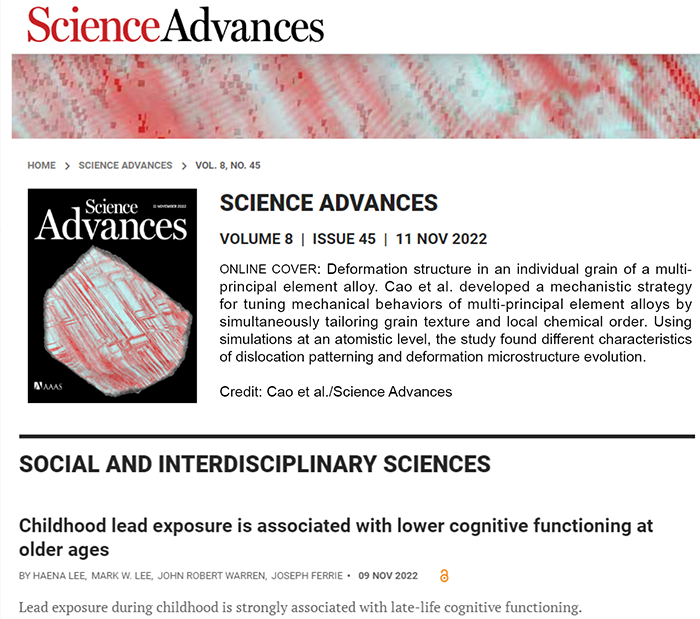Research Stories
Children Exposed to Lead may Experience Symptoms of Dementia Sooner
- First Korean sociologist published in Science Advances
- Presented a new research method in the field of health sociology research
Sociology
Prof.
LEE, HAENA
Prof. Haena Lee and colleagues published a study in Science Advances (IF: 14.14) on the long-term impact of childhood lead exposure on cognitive functioning in later life.
The study, one of the first to investigate the decades-long consequences of lead poisoning, suggests countries could face an explosion of people seeking support for dementia as individuals who were exposed to high lead levels during early life progress into old age.
Although scientists have long known that children and adults who are exposed to lead have poorer cognitive and educational outcomes, few studies have investigated the longer-term consequences.
Lee and her colleagues combined data from the US-based longitudinal Health and Retirement Study (HRS), which has followed the cognitive health of thousands of adults over several decades, with census records to pinpoint where 1,089 of these individuals lived as children. They also mapped the locations of towns and cities that used lead pipes and had acidic or alkaline water – a proxy for lead exposure.
The research revealed that people who lived in cities with lead-contaminated water as children had worse baseline cognitive functioning – a measure of their ability to learn, process information, and reason – at age 72, compared with those who did not. The difference was equivalent to being roughly eight years older.
Although childhood lead exposure doesn’t necessarily mean a person is at greater risk of dementia, the authors suggest that they may experience cognitive impairment earlier as they start out at a substantially lower point.
The team found no difference in the rate of cognitive decline between the two groups – possibly because their cognitive function was tested after any brain damage due to lead exposure had taken place.
Prof. Lee said, “More research is clearly and urgently needed to better understand the lifelong implications of childhood lead exposure for brain aging and to identify effective interventions to mitigate lead’s long-term consequences.”
This research has collaborated with Prof. John Robert Warren (Sociology, University of Minnesota), Dr. Mark Lee (Minnesota Population Center, University of Minnesota), and Prof. Joseph Ferrie (Economics, Northwestern University).
The Guardian article on this research can be found here: https://www.theguardian.com/society/2022/nov/09/children-exposed-to-lead-may-experience-symptoms-of-dementia-sooner-study
Please visit the website for more information.
DOI: 10.1126/sciadv.abn5164


